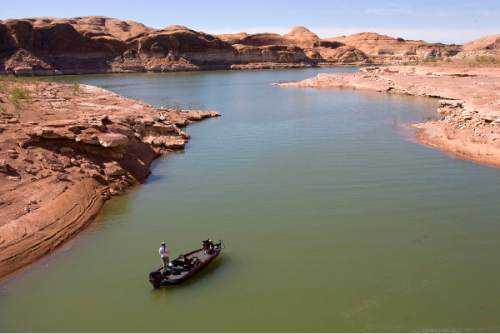This is an archived article that was published on sltrib.com in 2016, and information in the article may be outdated. It is provided only for personal research purposes and may not be reprinted.
The state senate will consider a water funding bill that harbors the potential to fund the Lake Powell Pipeline and other water projects at the positive recommendation of the senate's natural resources committee.
After a Wednesday afternoon hearing that attracted an overflow crowd, the Senate Natural Resources, Agriculture, and Environment Standing Committee voted 5-2 to support the bill, which would create a water infrastructure fund and divert a 1/16-cent sales tax to it.
That 1/16 sales tax is currently dedicated to funding transportation projects, but Sen. Stuart Adams, the bill's sponsor, said that money was originally intended to fund water projects.
Testimony during the hearing indicated that the 1/16 cent tax generates more than $30 million per year.
Opponents of the bill were quick to raise concerns that the money was intended to fund hotly contested, large-scale projects such as the Lake Powell Pipeline and the Bear River projects.
That is certainly a possibility in the future, Adams said, but for the time being he said the money from the sales tax would go to a revolving loan fund focused on helping local water authorities with infrastructure improvements.
"We don't know when [the funds will be used], we don't know where," he said, "but we do know that the quicker we start working on this problem, the quicker we start funding it, the less of a burden it's going to be on our kids and grandkids."
Representatives of various water districts spoke in support of SB80, laying out laundry lists of projects that require funding. Tage Flint, the general manager of the Weber County Water Conservancy district, said many Utahns rely on aging water infrastructure that was built by the federal government but that the federal government is now unable to maintain, which leaves it to local water agencies to fund necessary repairs.
"These water agencies are anticipating that they will take their financing ability to their limits in order to bond for these projects," Flint said. "If we don't start now … it's going to be very difficult to start in the future."
Zach Frankel, executive director of the Utah Rivers Council, characterized Adams' bill as Trojan horse to fund the pipeline on the public's dime.
"The people who will be asked to pay back these debts are not at this table to deliver their concerns," he said. "This loan fund is starting that debt. This is the beginning."
Frankel said he doubts the Washington and Kane County water conservancy districts — the recipients of the massive water project — are actually planning to repay the state's expenses as outlined in the 2006 legislative action that authorized the state to construct the pipeline.
"They claim to have a repayment schedule, but it's a secret," he told the committee. "They won't present it to the public."
And Adams acknowledged the state has already put itself in a position where it might have to play savior.
"The Bear River Project and the Lake Powell Pipeline have been voted on by the legislature; they are state water projects," he said. "After they've done all they can on the local level, there has been a commitment to try to step in and help with these projects. After they use every resource, they need some state help.



